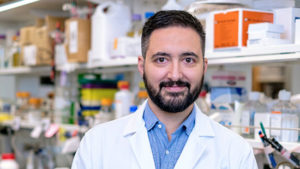
Northwestern Medicine investigators are advancing the understanding of two groups of transcription factors and their role in many neurodevelopmental diseases and cancers.
Detailed in two complimentary review papers, the authors make the case that improving understanding of the epigenetic mechanisms that cause the dysregulation of the Trithorax group (TrxG) of proteins and the Polycomb group (PcG) of proteins are essential for the development of novel therapeutic approaches.
“Polycomb and Trithorax were discovered over 80 years ago as the positive and the negative regulators of gene expression — Polycomb was thought to be a negative regulator of gene expression and Trithorax was opposing Polycomb’s function,” said Ali Shilatifard, PhD, the Robert Francis Furchgott Professor and chair of Biochemistry and Molecular Genetics and senior author of both review papers.
Delving into Polycomb Proteins
PcG proteins function within Polycomb repressive complexes, which modify histones and other proteins as well as silence target genes. In mammals, these proteins play a crucial role during development, and previous work suggested that their deregulation is associated with the promoting neurodevelopmental diseases and cancer.
PcG proteins are organized into two main complexes: Polycomb repressive complex 1 (PRC1) and Polycomb Repressive Complex 2 (PRC2), both of which control gene expression by modifying chromatin. Until recently, PRC1 and PRC2 were considered the only two versions of Polycomb repressive complexes. However, a review paper published in Nature Reviews Molecular Cell Biology suggests that there are likely hundreds of combinations, or “variants”, of PRC1 and PRC2.

“These variants are characterized by the presence of Polycomb proteins that specifically exist in one complex variant but not in another one,” said Andrea Piunti, PhD, a postdoctoral fellow in the Shilatifard laboratory and lead author of the paper.
Additionally, while the deregulation of PcG protein activity can promote tumor initiation and progression, there are also cases where these proteins may actually act as a barrier to cancer, according to Piunti.
“This unsolved question might be answered by looking at specific roles of Polycomb Repressive Complex variants. Some of them, when altered, might favor cancer progression while others might act as a roadblock for cancer cells. It is likely that this might be a cancer-specific or tissue-specific issue that still needs to be properly addressed,” Piunti said.
Exploring the Role of Trithorax
On the other hand, TrxG proteins form multi-protein complexes that counteract repressive developmental gene expression from PcG proteins, according to a second review paper published in Nature Reviews Genetics.
Previous work suggests two families of TrxG proteins — the COMPASS family of histone H3 lysine 4 methyltransferases and the SWI/SNF family of chromatin remodeling complexes —serve as essential regulators of gene expression during development. Additionally, the dysregulation of these complexes lead to a variety of neurodevelopmental disorders, such as intellectual disability, epileptic seizures and psychiatric diseases, and cancers.

“On a broad functional level, both families can promote an active state of chromatin and, subsequently, their dysregulation can lead to similar types of developmental disorders and malignancies through mis-expression of their overlapping target genes and aberrant activation of the repressed transcriptional state,” said Bercin Cenik, MD, PhD, a postdoctoral fellow in the Shilatifard laboratory and lead author of the paper.
The TrxG protein family is also one the most highly mutated group of genes in cancer — almost 20 percent of all human malignancies contain mutations in the SWI/SNF genes. According to Cenik, this reaffirms the notion that understanding the epigenetic mechanisms by which COMPASS and SWI/SNF cause neurodevelopmental diseases and cancers is essential for developing targeted therapeutic approaches.
Shilatifard is also a member of Northwestern’s Chemistry of Life Processes Institute and leads the Cancer Epigenetics and Nuclear Dynamics Research Program at the Robert H. Lurie Comprehensive Cancer Center of Northwestern University.
Piunti and Shilatifard were supported by the Transition to Independence grant K99CA234434 and the National Cancer Institute Outstanding Investigator Award R35CA197569.






